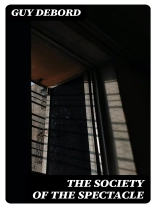In ‘The Society of the Spectacle, ‘ Guy Debord presents a critical analysis of contemporary society, where social life is increasingly mediated by images and representations. Written in a provocative and aphoristic style, Debord’s text is an incisive examination of how spectacle—defined as the commodified representations of life—shapes human experience, social relations, and consciousness. Contextually rooted in Marxist theory, the book articulates the ways in which capitalism subsumes authentic social relations into a superficial spectacle, affecting both perception and reality. Its vivid discussions and theoretical depth render it a foundational text in the realms of cultural criticism, media studies, and revolutionary theory. Debord, a founding member of the Situationist International, was deeply influenced by the socio-political upheavals of post-war France, particularly May 1968, which informed his view of alienation in modern life. His experiences as a filmmaker and theorist led him to investigate the intersections of art, politics, and daily existence, culminating in this seminal work that critiques the banality of consumer culture. Debord’s erudition and radical insights are products of his time, yet resonate with the contemporary landscape of digital media and cultural commodification. Highly recommended for scholars, activists, and anyone interested in understanding the pervasive influence of media in shaping modern identity, ‘The Society of the Spectacle’ challenges readers to question their engagement with the spectacle and to redefine the parameters of authentic social interaction in an age dominated by images.
Об авторе
Guy Debord was a French Marxist theorist, writer, filmmaker, and founding member of the avant-garde movement known as the Situationist International (SI). Born on December 28, 1931, in Paris, he became one of the most influential critics of the 20th century, regarding the pervasive power of modern media and commodity culture. Debord is best known for his seminal work, ‘The Society of the Spectacle’ (1967), in which he develops the concept of the ‘spectacle’—a representation of the capitalist economy that mediates human relations through images. This revolutionary text uses Marxist critique to explicate how the spectacle dominates and distorts human experiences in modern society. Debord’s theory has proved prescient in the face of contemporary media and the global information economy, influencing fields as diverse as political theory, sociology, and media studies. His style is characterized by its critical depth, sharp polemics, and a dialectical approach to cultural phenomena. Debord’s work remains a cornerstone for those analyzing the intersections between culture, politics, and the economics of late capitalism. His contribution extends beyond the theoretical; Debord was also an experimental filmmaker, using the medium to subvert and critique the very ‘spectacles’ he theorized about. Guy Debord’s profound impact on radical thought continues to reverberate, inspiring new generations to question the images and narratives that shape their world.












